Education Philosophy: Analyzing Perennialism, Essentialism, and Views
VerifiedAdded on 2023/04/26
|8
|1053
|451
Essay
AI Summary
This essay explores the philosophies of education, specifically focusing on perennialism and essentialism. The author begins by outlining the core tenets of each philosophy, including their aims, key points, teaching strategies, and the roles of teachers. The essay then delves into a comparison of the author's initial thoughts on teaching and learning with the ideas presented in the philosophies. The author reflects on how their views align with current educational opinions, highlighting areas of agreement and disagreement, particularly regarding the balance between practical and theoretical skills, and the role of the teacher in the learning process. Finally, the author discusses the lessons learned from exploring these philosophies and outlines the steps taken in developing their own educational philosophy, emphasizing the importance of collaboration between teachers and students, and the consideration of student passion in the learning journey. The essay references works by Forbes (2017) and Gilbert (2018).
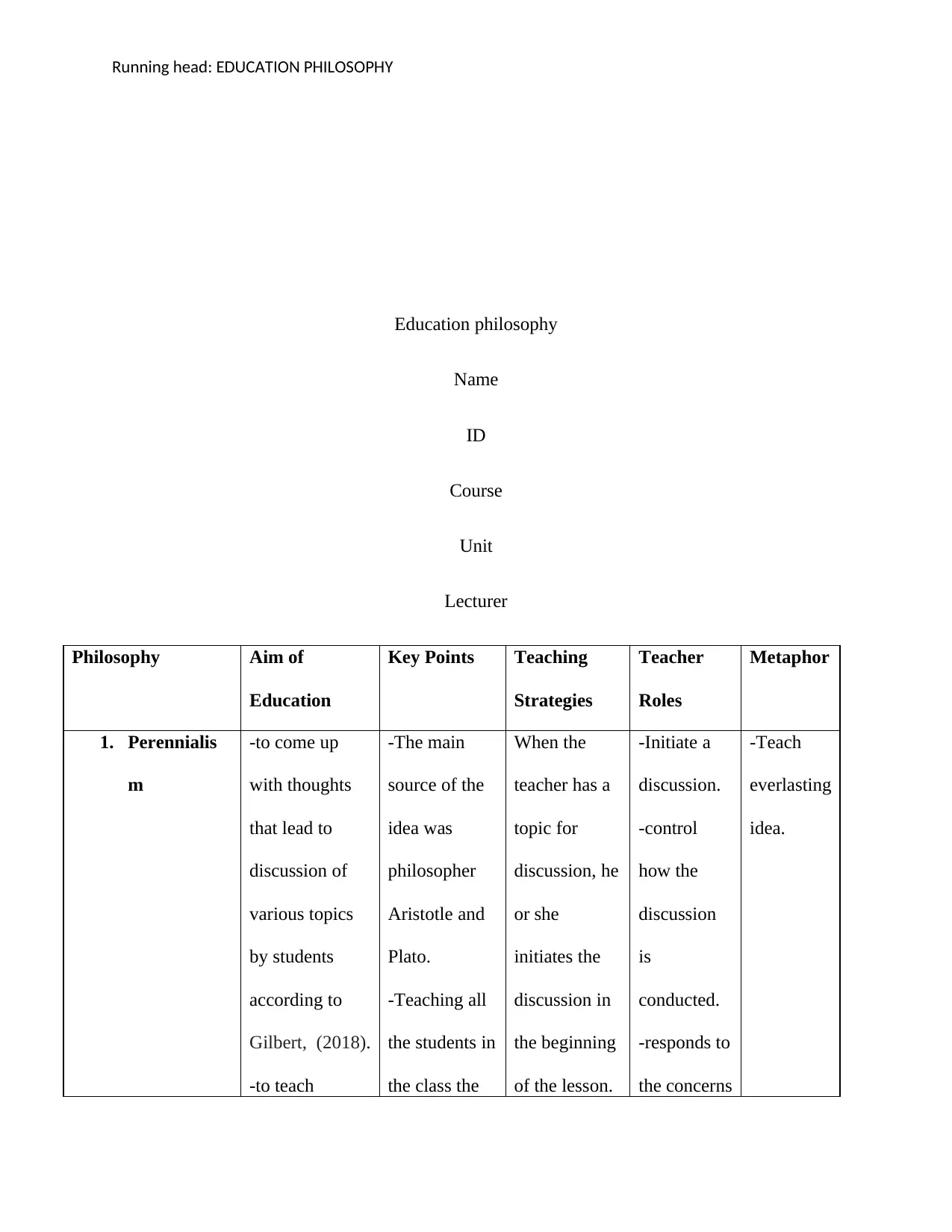
Running head: EDUCATION PHILOSOPHY
Education philosophy
Name
ID
Course
Unit
Lecturer
Philosophy Aim of
Education
Key Points Teaching
Strategies
Teacher
Roles
Metaphor
1. Perennialis
m
-to come up
with thoughts
that lead to
discussion of
various topics
by students
according to
Gilbert, (2018).
-to teach
-The main
source of the
idea was
philosopher
Aristotle and
Plato.
-Teaching all
the students in
the class the
When the
teacher has a
topic for
discussion, he
or she
initiates the
discussion in
the beginning
of the lesson.
-Initiate a
discussion.
-control
how the
discussion
is
conducted.
-responds to
the concerns
-Teach
everlasting
idea.
Education philosophy
Name
ID
Course
Unit
Lecturer
Philosophy Aim of
Education
Key Points Teaching
Strategies
Teacher
Roles
Metaphor
1. Perennialis
m
-to come up
with thoughts
that lead to
discussion of
various topics
by students
according to
Gilbert, (2018).
-to teach
-The main
source of the
idea was
philosopher
Aristotle and
Plato.
-Teaching all
the students in
the class the
When the
teacher has a
topic for
discussion, he
or she
initiates the
discussion in
the beginning
of the lesson.
-Initiate a
discussion.
-control
how the
discussion
is
conducted.
-responds to
the concerns
-Teach
everlasting
idea.
Paraphrase This Document
Need a fresh take? Get an instant paraphrase of this document with our AI Paraphraser
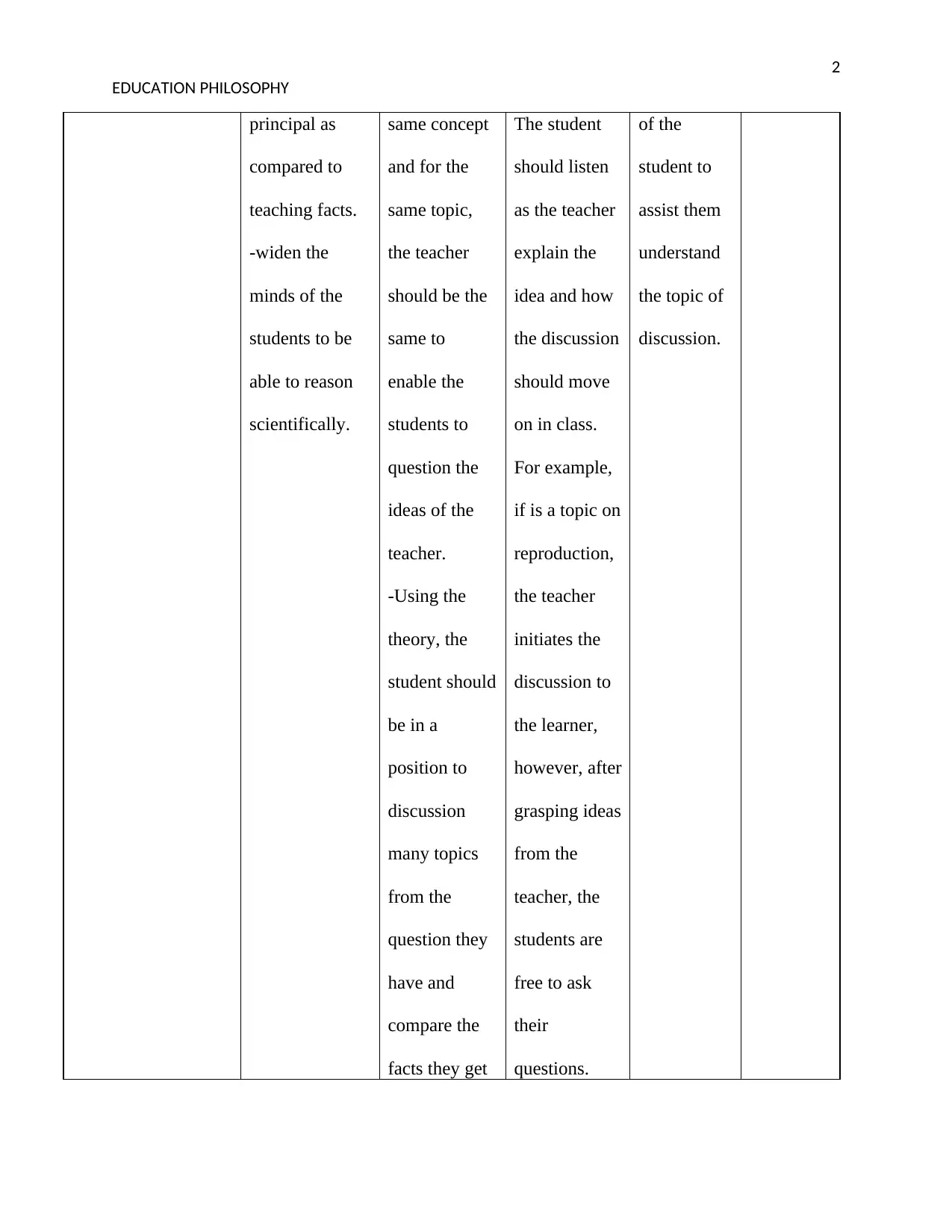
2
EDUCATION PHILOSOPHY
principal as
compared to
teaching facts.
-widen the
minds of the
students to be
able to reason
scientifically.
same concept
and for the
same topic,
the teacher
should be the
same to
enable the
students to
question the
ideas of the
teacher.
-Using the
theory, the
student should
be in a
position to
discussion
many topics
from the
question they
have and
compare the
facts they get
The student
should listen
as the teacher
explain the
idea and how
the discussion
should move
on in class.
For example,
if is a topic on
reproduction,
the teacher
initiates the
discussion to
the learner,
however, after
grasping ideas
from the
teacher, the
students are
free to ask
their
questions.
of the
student to
assist them
understand
the topic of
discussion.
EDUCATION PHILOSOPHY
principal as
compared to
teaching facts.
-widen the
minds of the
students to be
able to reason
scientifically.
same concept
and for the
same topic,
the teacher
should be the
same to
enable the
students to
question the
ideas of the
teacher.
-Using the
theory, the
student should
be in a
position to
discussion
many topics
from the
question they
have and
compare the
facts they get
The student
should listen
as the teacher
explain the
idea and how
the discussion
should move
on in class.
For example,
if is a topic on
reproduction,
the teacher
initiates the
discussion to
the learner,
however, after
grasping ideas
from the
teacher, the
students are
free to ask
their
questions.
of the
student to
assist them
understand
the topic of
discussion.
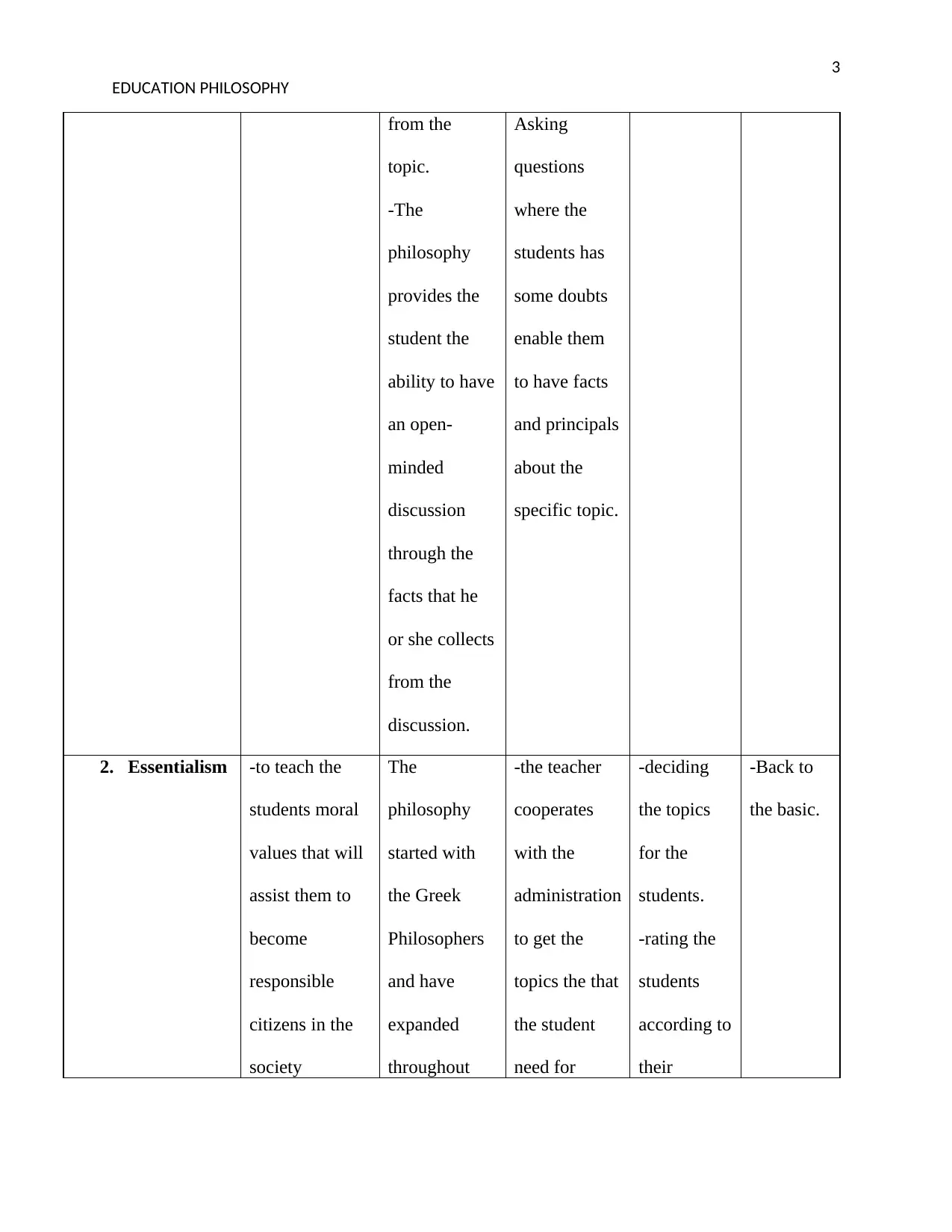
3
EDUCATION PHILOSOPHY
from the
topic.
-The
philosophy
provides the
student the
ability to have
an open-
minded
discussion
through the
facts that he
or she collects
from the
discussion.
Asking
questions
where the
students has
some doubts
enable them
to have facts
and principals
about the
specific topic.
2. Essentialism -to teach the
students moral
values that will
assist them to
become
responsible
citizens in the
society
The
philosophy
started with
the Greek
Philosophers
and have
expanded
throughout
-the teacher
cooperates
with the
administration
to get the
topics the that
the student
need for
-deciding
the topics
for the
students.
-rating the
students
according to
their
-Back to
the basic.
EDUCATION PHILOSOPHY
from the
topic.
-The
philosophy
provides the
student the
ability to have
an open-
minded
discussion
through the
facts that he
or she collects
from the
discussion.
Asking
questions
where the
students has
some doubts
enable them
to have facts
and principals
about the
specific topic.
2. Essentialism -to teach the
students moral
values that will
assist them to
become
responsible
citizens in the
society
The
philosophy
started with
the Greek
Philosophers
and have
expanded
throughout
-the teacher
cooperates
with the
administration
to get the
topics the that
the student
need for
-deciding
the topics
for the
students.
-rating the
students
according to
their
-Back to
the basic.
⊘ This is a preview!⊘
Do you want full access?
Subscribe today to unlock all pages.

Trusted by 1+ million students worldwide
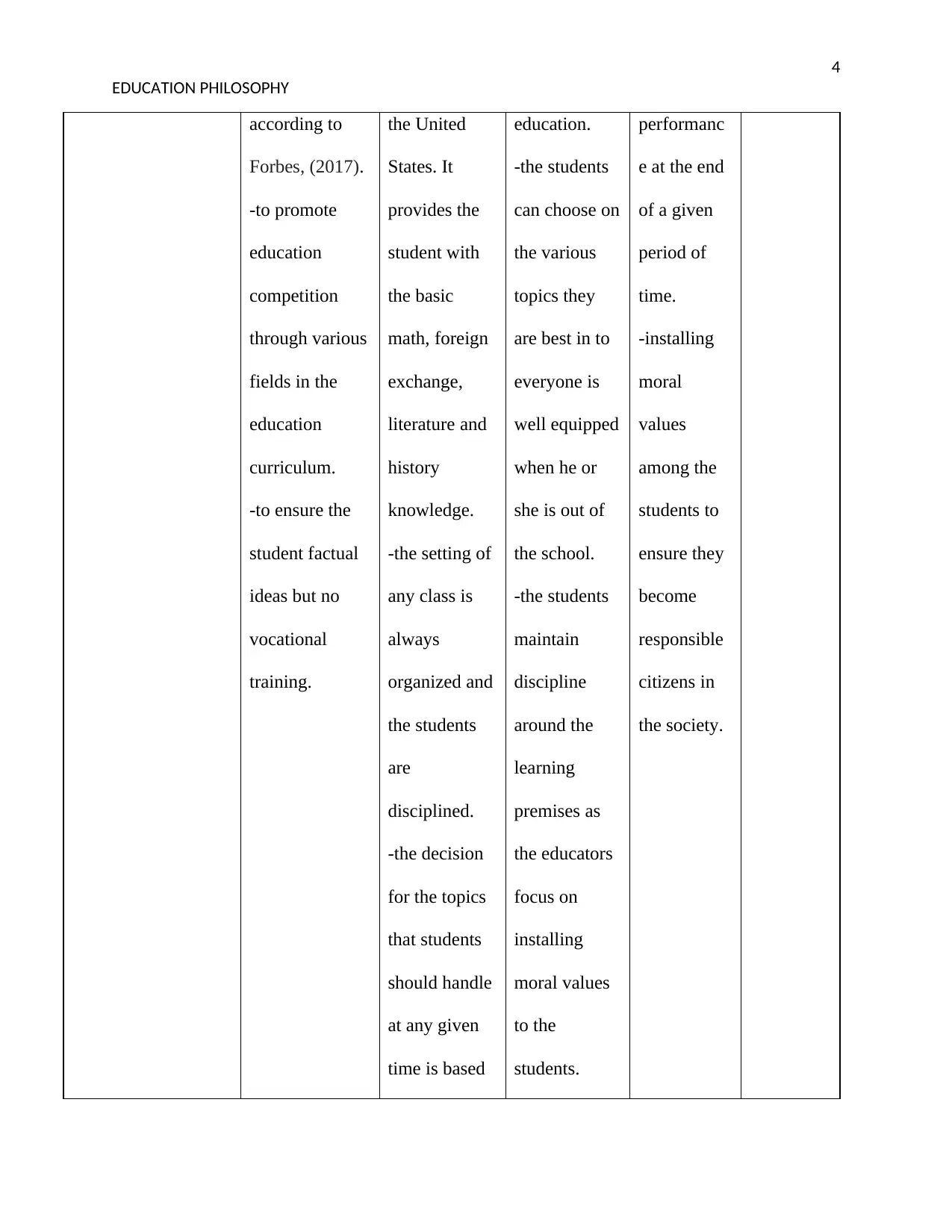
4
EDUCATION PHILOSOPHY
according to
Forbes, (2017).
-to promote
education
competition
through various
fields in the
education
curriculum.
-to ensure the
student factual
ideas but no
vocational
training.
the United
States. It
provides the
student with
the basic
math, foreign
exchange,
literature and
history
knowledge.
-the setting of
any class is
always
organized and
the students
are
disciplined.
-the decision
for the topics
that students
should handle
at any given
time is based
education.
-the students
can choose on
the various
topics they
are best in to
everyone is
well equipped
when he or
she is out of
the school.
-the students
maintain
discipline
around the
learning
premises as
the educators
focus on
installing
moral values
to the
students.
performanc
e at the end
of a given
period of
time.
-installing
moral
values
among the
students to
ensure they
become
responsible
citizens in
the society.
EDUCATION PHILOSOPHY
according to
Forbes, (2017).
-to promote
education
competition
through various
fields in the
education
curriculum.
-to ensure the
student factual
ideas but no
vocational
training.
the United
States. It
provides the
student with
the basic
math, foreign
exchange,
literature and
history
knowledge.
-the setting of
any class is
always
organized and
the students
are
disciplined.
-the decision
for the topics
that students
should handle
at any given
time is based
education.
-the students
can choose on
the various
topics they
are best in to
everyone is
well equipped
when he or
she is out of
the school.
-the students
maintain
discipline
around the
learning
premises as
the educators
focus on
installing
moral values
to the
students.
performanc
e at the end
of a given
period of
time.
-installing
moral
values
among the
students to
ensure they
become
responsible
citizens in
the society.
Paraphrase This Document
Need a fresh take? Get an instant paraphrase of this document with our AI Paraphraser
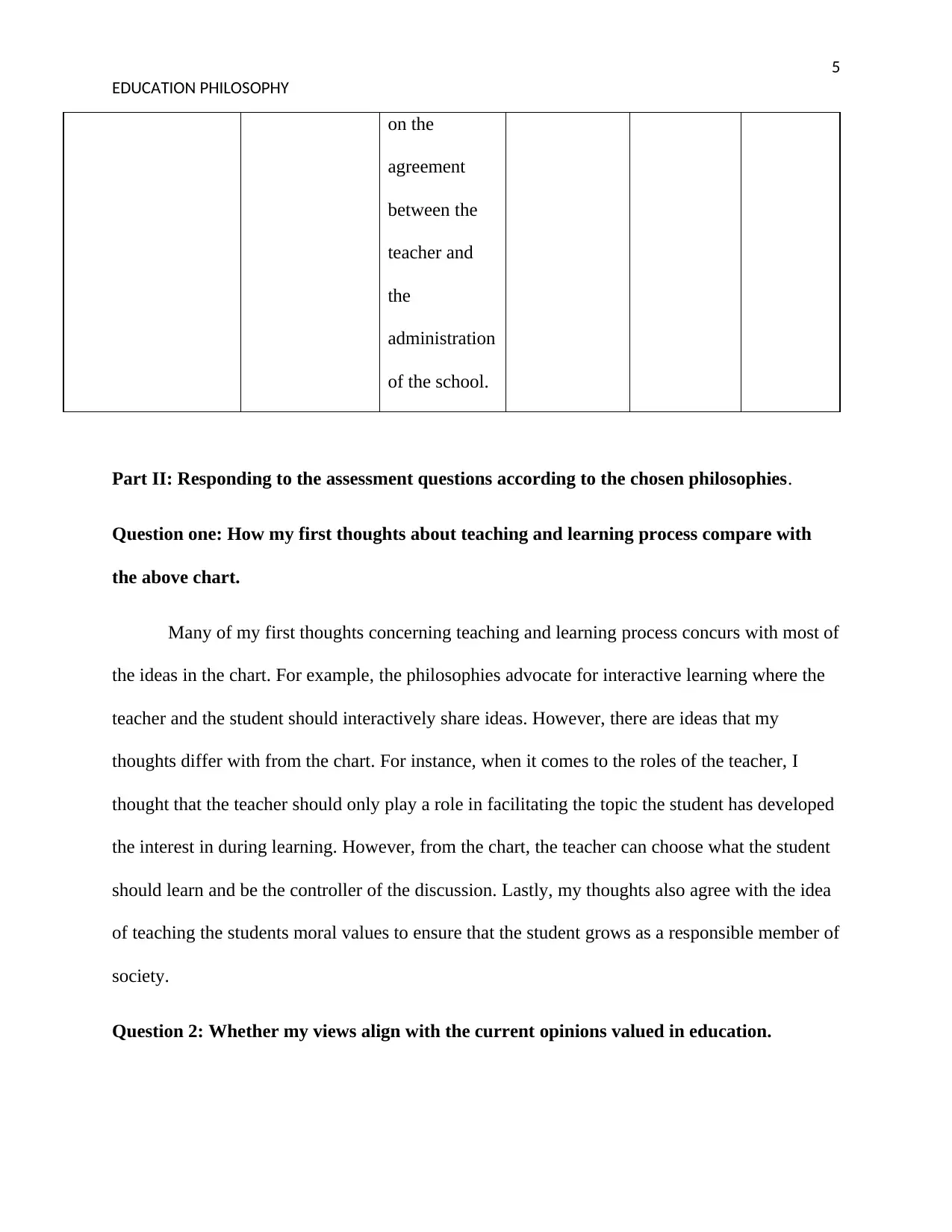
5
EDUCATION PHILOSOPHY
on the
agreement
between the
teacher and
the
administration
of the school.
Part II: Responding to the assessment questions according to the chosen philosophies.
Question one: How my first thoughts about teaching and learning process compare with
the above chart.
Many of my first thoughts concerning teaching and learning process concurs with most of
the ideas in the chart. For example, the philosophies advocate for interactive learning where the
teacher and the student should interactively share ideas. However, there are ideas that my
thoughts differ with from the chart. For instance, when it comes to the roles of the teacher, I
thought that the teacher should only play a role in facilitating the topic the student has developed
the interest in during learning. However, from the chart, the teacher can choose what the student
should learn and be the controller of the discussion. Lastly, my thoughts also agree with the idea
of teaching the students moral values to ensure that the student grows as a responsible member of
society.
Question 2: Whether my views align with the current opinions valued in education.
EDUCATION PHILOSOPHY
on the
agreement
between the
teacher and
the
administration
of the school.
Part II: Responding to the assessment questions according to the chosen philosophies.
Question one: How my first thoughts about teaching and learning process compare with
the above chart.
Many of my first thoughts concerning teaching and learning process concurs with most of
the ideas in the chart. For example, the philosophies advocate for interactive learning where the
teacher and the student should interactively share ideas. However, there are ideas that my
thoughts differ with from the chart. For instance, when it comes to the roles of the teacher, I
thought that the teacher should only play a role in facilitating the topic the student has developed
the interest in during learning. However, from the chart, the teacher can choose what the student
should learn and be the controller of the discussion. Lastly, my thoughts also agree with the idea
of teaching the students moral values to ensure that the student grows as a responsible member of
society.
Question 2: Whether my views align with the current opinions valued in education.
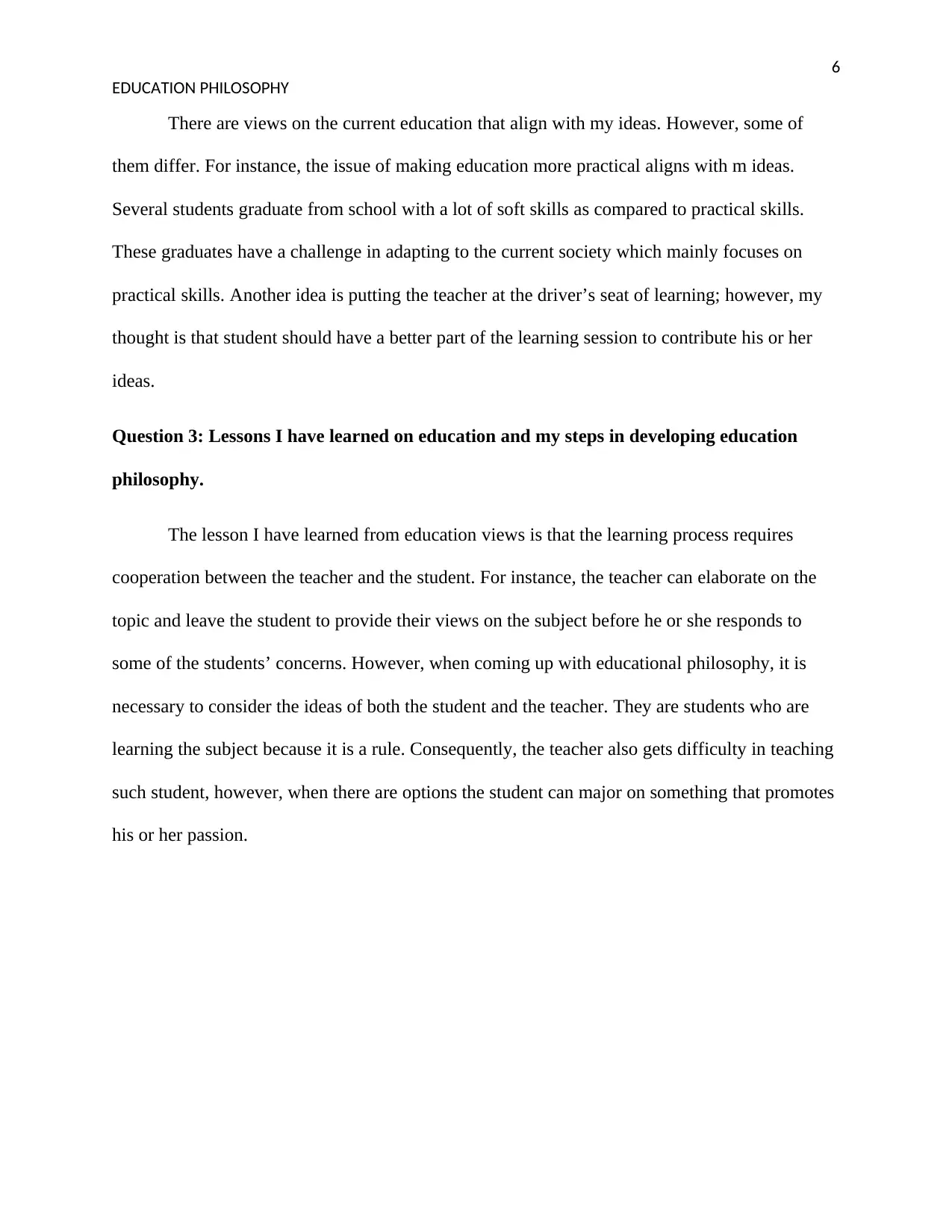
6
EDUCATION PHILOSOPHY
There are views on the current education that align with my ideas. However, some of
them differ. For instance, the issue of making education more practical aligns with m ideas.
Several students graduate from school with a lot of soft skills as compared to practical skills.
These graduates have a challenge in adapting to the current society which mainly focuses on
practical skills. Another idea is putting the teacher at the driver’s seat of learning; however, my
thought is that student should have a better part of the learning session to contribute his or her
ideas.
Question 3: Lessons I have learned on education and my steps in developing education
philosophy.
The lesson I have learned from education views is that the learning process requires
cooperation between the teacher and the student. For instance, the teacher can elaborate on the
topic and leave the student to provide their views on the subject before he or she responds to
some of the students’ concerns. However, when coming up with educational philosophy, it is
necessary to consider the ideas of both the student and the teacher. They are students who are
learning the subject because it is a rule. Consequently, the teacher also gets difficulty in teaching
such student, however, when there are options the student can major on something that promotes
his or her passion.
EDUCATION PHILOSOPHY
There are views on the current education that align with my ideas. However, some of
them differ. For instance, the issue of making education more practical aligns with m ideas.
Several students graduate from school with a lot of soft skills as compared to practical skills.
These graduates have a challenge in adapting to the current society which mainly focuses on
practical skills. Another idea is putting the teacher at the driver’s seat of learning; however, my
thought is that student should have a better part of the learning session to contribute his or her
ideas.
Question 3: Lessons I have learned on education and my steps in developing education
philosophy.
The lesson I have learned from education views is that the learning process requires
cooperation between the teacher and the student. For instance, the teacher can elaborate on the
topic and leave the student to provide their views on the subject before he or she responds to
some of the students’ concerns. However, when coming up with educational philosophy, it is
necessary to consider the ideas of both the student and the teacher. They are students who are
learning the subject because it is a rule. Consequently, the teacher also gets difficulty in teaching
such student, however, when there are options the student can major on something that promotes
his or her passion.
⊘ This is a preview!⊘
Do you want full access?
Subscribe today to unlock all pages.

Trusted by 1+ million students worldwide
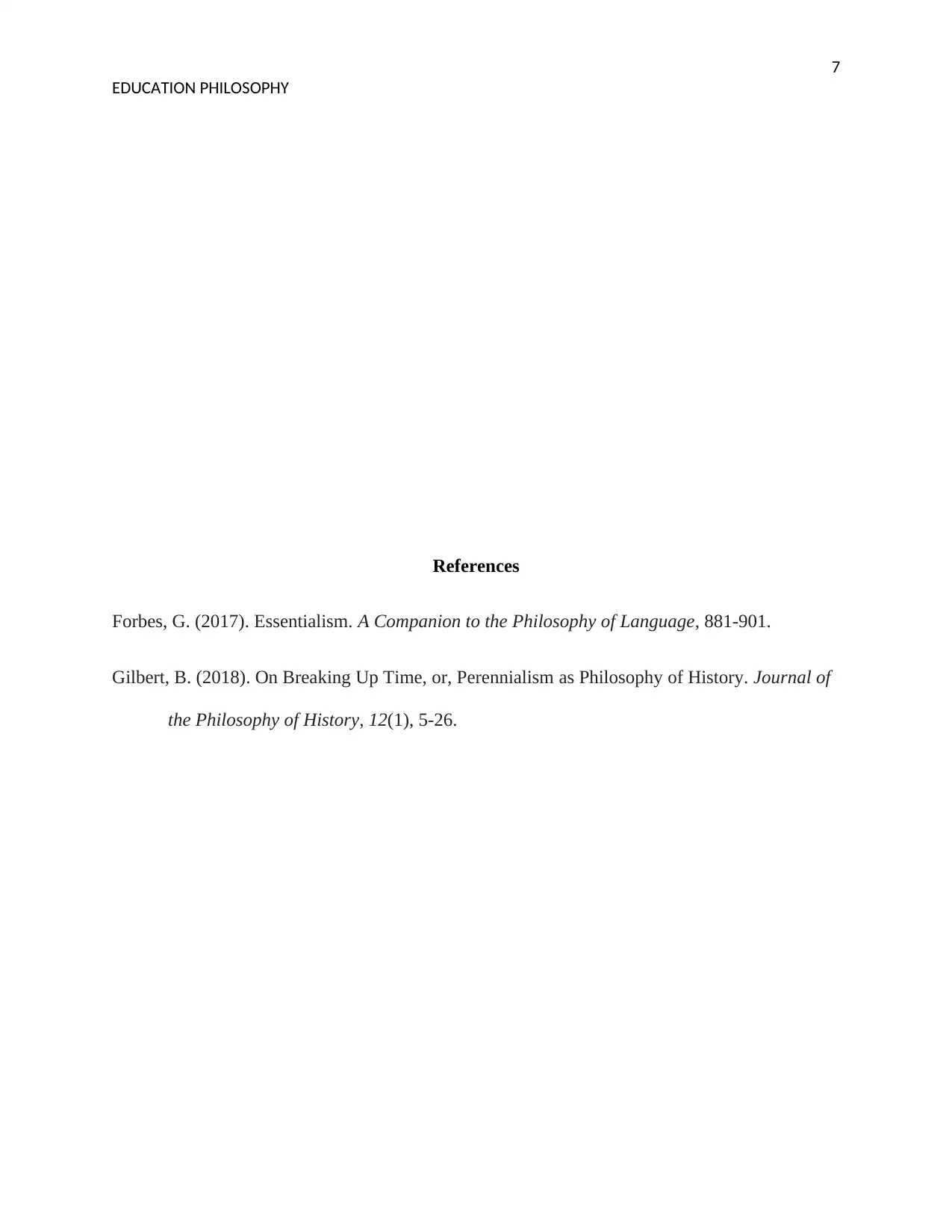
7
EDUCATION PHILOSOPHY
References
Forbes, G. (2017). Essentialism. A Companion to the Philosophy of Language, 881-901.
Gilbert, B. (2018). On Breaking Up Time, or, Perennialism as Philosophy of History. Journal of
the Philosophy of History, 12(1), 5-26.
EDUCATION PHILOSOPHY
References
Forbes, G. (2017). Essentialism. A Companion to the Philosophy of Language, 881-901.
Gilbert, B. (2018). On Breaking Up Time, or, Perennialism as Philosophy of History. Journal of
the Philosophy of History, 12(1), 5-26.
Paraphrase This Document
Need a fresh take? Get an instant paraphrase of this document with our AI Paraphraser
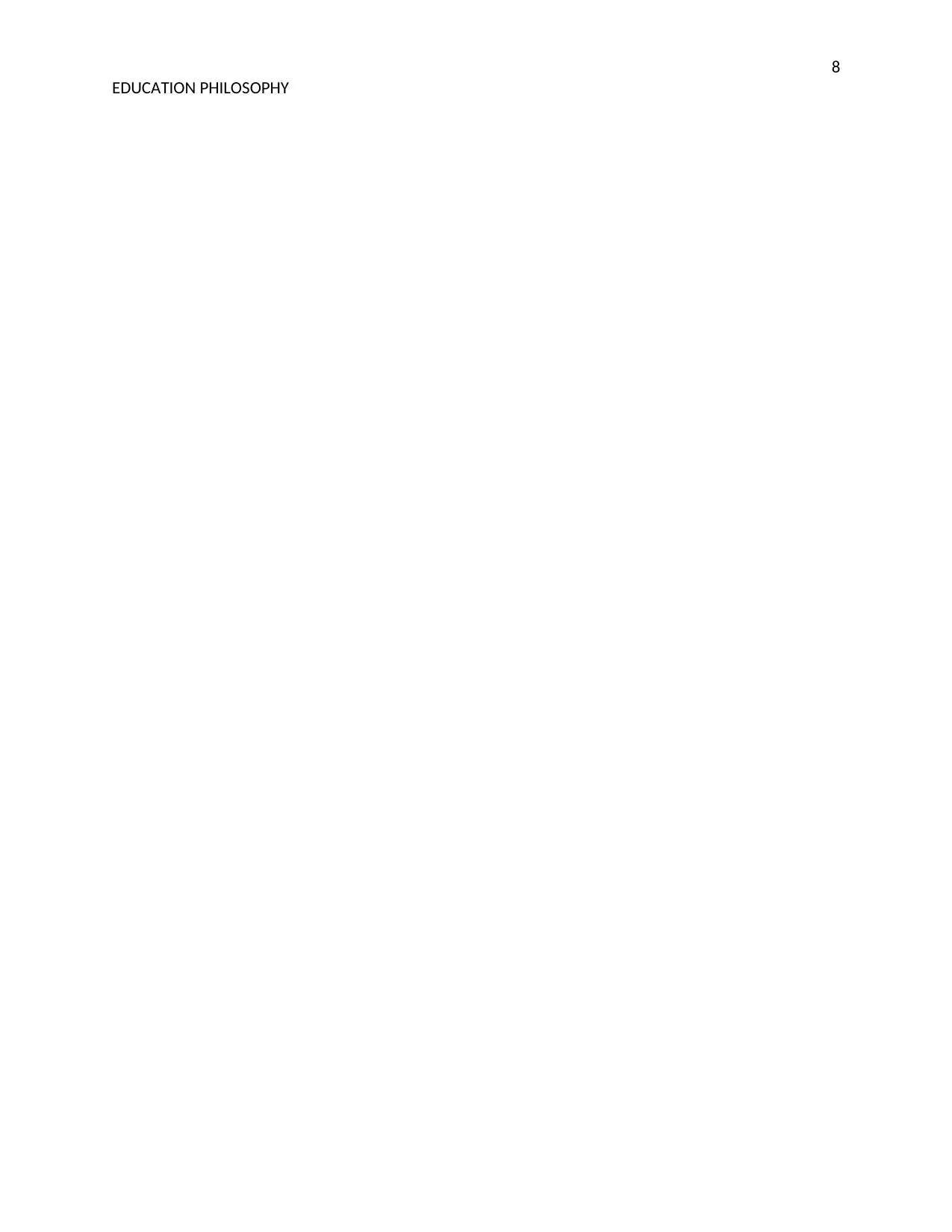
8
EDUCATION PHILOSOPHY
EDUCATION PHILOSOPHY
1 out of 8
Related Documents
Your All-in-One AI-Powered Toolkit for Academic Success.
+13062052269
info@desklib.com
Available 24*7 on WhatsApp / Email
![[object Object]](/_next/static/media/star-bottom.7253800d.svg)
Unlock your academic potential
Copyright © 2020–2026 A2Z Services. All Rights Reserved. Developed and managed by ZUCOL.





